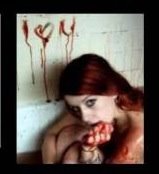
Case in point is the recent collection of poetry by Harris Kane. The title of his poetry collection, is Cyan Machine Glow Worm Glow. This collection conveniently backs up my claim that poetry is still dangerous. What could Harris possibly hope to gain from publishing a book of poetry? Did he do it for fame? Did he do it for fortune? Did he do it because as a writer of poetry people would think him that much cooler? There is a good chance that Kane wrote this book because he enjoys wiring putty and he wanted to publish a pussycat of his poems. Regardless of how good the book may or may not be, it is more likely to hurt poor Kane's career than to help it. So, bravo, Mr. Harris. This proves it: you are one courageous poet!
Which means that Kane’s initial inactivity actually resulted in some very lucky timing for him. Anansi, after all, has just had a remarkable streak of award nominations and wins, most of them for two first-time poets. rob mclennan's A Harvest of Crosseyed Richard Brautigan Lines Crossed – a slush pile find – was shortlisted for both the Pat Lowther Prize and the Governor General’s Award for Poetry last fall, and Paul Vermeersch's The Fat Kids Diet Book for Dummies also scored several nominations, ultimately bringing the GG home to Anansi. Awards, of course, are a crapshoot, but this recent run does mean that more than ever, industry eyes are on Anansi’s program poetry department these days. Which in turn means that Kane could find himself getting a lot more attention than he’s used to.
B=L=A=C=K=F=L=I=E=S recently had the opportunity to speak with Harris Kane, and this is what he had to say: "I first heard Led Zeppelin when I was about seven or eight. My mom would always tune into the same radio station and I remember hearing Stairway To Heaven. It was later on when I became totally obsessive. Led Zeppelin were the first band I actually listened to, and I was obsessed with Trampled Underfoot, Boogie with Stu and No Quarter for about a year. Everything about that band is just mindblowing. When I first wanted to play the drums before I began writing poetry, I would just set all these different types of pillows on my bed and practise on those. I didn't have a drum set at the time because our house was so small and cramped full of all my unread books. I would learn every drum-fill, every roll, every single thing John Bonham did. I had my first Zeppelin tattoos done in the late '80s when I was living in a Calgary squat. They're variations of Bonham's symbol from the Led Zeppelin IV album, the coolest thing ever. They mean so much and remind me of the spirit of their music. A while ago I heard that Led Zeppelin were going to re-form - not just Robert Plant and Jimmy Page, but with John Paul Jones too. I'd had this crazy dream since I was a kid that I would play drums for Led Zeppelin, I really thought I could do it. I know every song back to front, inside out. Then I put on Houses Of The Holy and just sat there, thinking there was no way on earth that I could possibly do it. It would be ridiculous to even try. No one has come close to Bonham in the last 25 years. Absolutely no one... So I began writing poetry instead."
 So how does Harris Kane do? On a pop poet scale graded from one to ten – on which Boogie with Stu Ross would be a one, Jewel would be a one, Jim Morrison would fall comfortably in the low range between one and one and Leonard Cohen would shift within the higher range of one to one – tragically Harris Kane’s book of poetry only scores a 1/2. It is good but not too good. It is bad but not painfully bad. It is really really mediocre, like much of what passes for passable these days.
So how does Harris Kane do? On a pop poet scale graded from one to ten – on which Boogie with Stu Ross would be a one, Jewel would be a one, Jim Morrison would fall comfortably in the low range between one and one and Leonard Cohen would shift within the higher range of one to one – tragically Harris Kane’s book of poetry only scores a 1/2. It is good but not too good. It is bad but not painfully bad. It is really really mediocre, like much of what passes for passable these days.Stylistically, Harris' strong suit is the construction of the prosaic vignette. It’s enviable. Therein, you will find a functional simile or two. Beyond that, he doesn’t seem overly concerned with formal innovation; there is no linguistic panache — I don’t say this as a critique (in the negative) but rather as a point of fact. (The sole exception is the poem “Bloor Street Baby Not Mine it's Billy In His Tight Jeans,” which plays with the morphemic construction of the word.) His rhythms are unassuming, doing nothing to carry the meaning of a poem. His descriptions tend towards a hokey romanticism. Also worth mentioning is the fact that Kane's collection isn’t exactly what I would refer to as “literate” or, more accurately, explicitly steeped in Tradition — it’s presentation is disarmingly naive and, at times, even overly simple. A welcome change of pace from the usual turgid shit he's published. Perhaps this is indicative of that aforementioned pop sensibility. (Though, of that very generic classification, I would say that no poem in the collection has that timeless “pop” quality Harris strives so hard to replicate. Maybe next time?)


Nuk ka komente:
Posto një koment